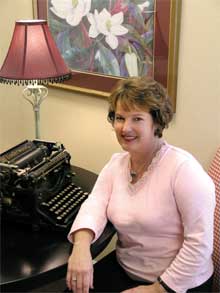
Summer is coming to a close and school bells are ringing once again. Am I dating myself by saying “school bells”? Does a bell actually signal the beginning of a school day now? Come to think of it, the only bells I’ve heard as a Lake-Sumter Community College adjunct instructor are from cell phones. And those aren’t really bells—just ringtones, or the latest American Idol song.
Thinking about how much society has changed during the past 18 years makes me realize that my perspective on cultural or historical events is certainly going to be different than the 18-year-olds who sit in my class.
Today’s typical college freshmen were born in 1990. They can remember only a Bush or Clinton as president. The Hubble Telescope has been in space as long as they’ve been on this Earth, and Germany has always been a unified country to them. Nintendo’s Game Boy was born only a year before they were, and video games were always around to entertain them when Mom handed over the latchkey. No big deal to be home alone.
The times, they are a-changin’ though, as one famous songwriter once said. More and more baby boomers are returning to college. The number of college students ages 40 to 64 has jumped by almost 20 percent to nearly 2 million in the past decade, according to the National Center for Education Statistics. The numbers are expected to grow as boomers retrain themselves for new careers. Many retirees just want to keep their minds active by learning new languages or skills that they didn’t have time to pursue when they were holding down full-time jobs. Retirement communities linked to colleges are a growing trend nationwide.
The French term for back-to-school is “rentrée,” to signal the beginning of normal routines after August vacations. The term certainly applies to people re-entering school during the second half of their lives.
Classes with multiple generations of students are always interesting, especially when they have to work together on projects. Occasionally, one or the other will get a quizzical look, especially when talking about music or the past, but they quickly tend to help each other transcend the generational communication gaps.
Baby boomers often have different perspectives among themselves. After all, the span from 1946 to 1964 covers a lot of history for the 82.8 million boomers who make up the most educated generation in history.
A few weeks ago, an only slightly younger friend and I were talking about the Cuban Missile Crisis of 1962. What a difference a few years can make in how we relate to historical events. When the emergency signal sounded at my elementary school, my classmates and I knew to take cover under our desks. My friend never experienced that scary practice drill because she was not yet in the first grade when Castro and the Russians were making nuclear deals. The duck-for-cover drills were only something she had read about or seen in old films.
If you are returning to college this fall, embrace the diversity of ages. Learn from each other. That lad or lass with tattoos and orange-streaked hair may have a worthwhile and creative idea that will make class even more interesting. And if you are a young whippersnapper, let that aging baby boomer serve as a reminder about how quickly time passes or how fast job skills can become outdated. No matter your age, you are never too old to learn something new before the final bell tolls.
Happy reading,
Mary Ann






